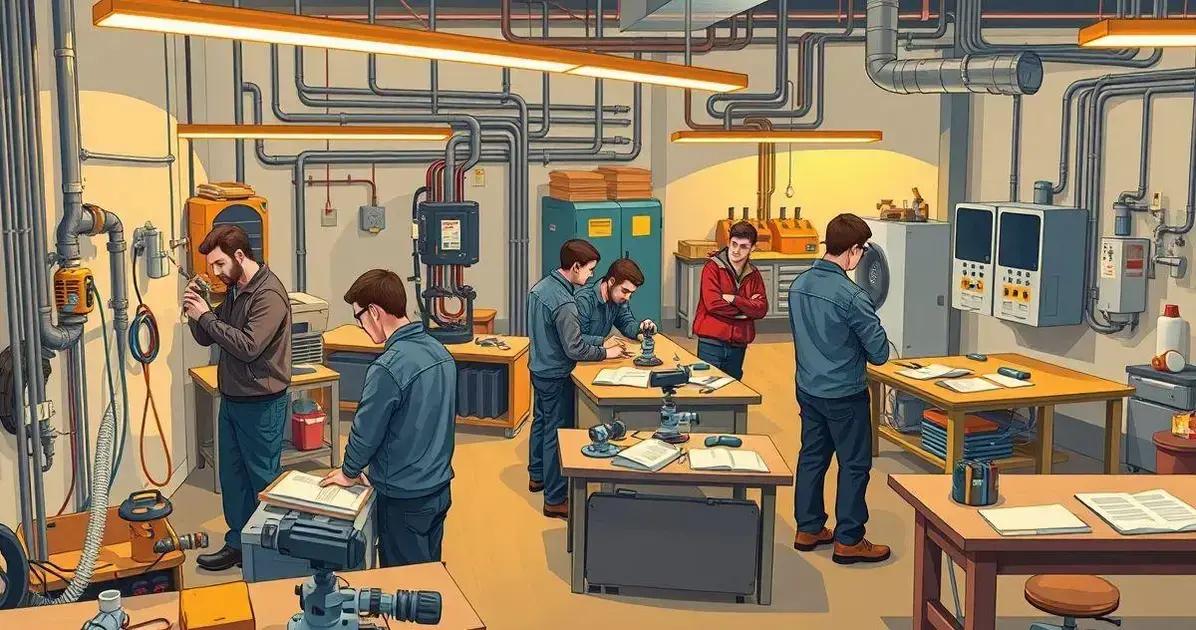High-demand Trade Jobs: Discover Lucrative Careers You Can’t Ignore
Anúncios
In today’s ever-evolving job market, High-demand Trade Jobs stand out as a lucrative and stable option. These careers not only offer financial security but also provide opportunities for growth and advancement. Learning about the various trades, from electricians to HVAC technicians, can open doors to prosperous futures. This article will delve into the top trades, essential skills, and educational pathways needed to thrive in these roles. Let’s explore the challenges, opportunities, and future trends shaping the world of trade employment.
Understanding High-demand Trade Jobs
In the vast landscape of career choices, understanding high-demand trade jobs opens up opportunities for stable and rewarding paths. Trade jobs such as plumbing, electrical work, and HVAC play critical roles in maintaining infrastructure. These jobs are essential and consistently required, ensuring steady employment.
What Constitutes a High-demand Trade Job?
High-demand trade jobs are professions requiring specific skills and training. These roles are essential in various industries, including construction, manufacturing, and maintenance. Demand for these jobs often outpaces the supply of skilled workers.
Why Are These Jobs in High Demand?
Several factors contribute to the high demand for these jobs, including economic growth and technological advances. Additionally, an aging workforce in these sectors leads to a growing need for new talent.
Trade jobs are not only stable but can also lead to entrepreneurial opportunities. Skilled tradespeople can start their own businesses, offering services in their area of expertise.
Top High-demand Trade Occupations

Various top high-demand trade occupations offer lucrative and stable career options, fulfilling the need for skilled professionals in numerous industries. One prominent trade is electricians, who install and maintain electrical systems. Their work is essential across residential, commercial, and industrial spaces.
Plumbing
Plumbers are vital for installing and repairing water and sewage systems. Their expertise ensures safe and efficient water flow in homes and businesses.
HVAC Technicians
Heating, ventilation, and air conditioning (HVAC) technicians play a key role in maintaining indoor climate control systems, keeping environments comfortable and energy-efficient.
Welders join metals, a skill crucial in construction and manufacturing. Their work supports building infrastructure and producing goods.
Trade mechanics and automotive technicians ensure vehicles operate safely and efficiently by diagnosing mechanical issues and performing repairs.
Essential Skills for Thriving in Trade Careers
To excel in trade careers, a range of essential skills is necessary. First and foremost is technical aptitude. This includes understanding how systems work and being able to troubleshoot issues effectively. Such skills are crucial for electricians, plumbers, and HVAC technicians.
Practical Problem-solving
Tradespeople often face unexpected challenges. Strong problem-solving skills enable them to devise quick and effective solutions, ensuring timely project completion and maintaining job quality.
Attention to Detail
Precise work is critical in trade professions. Attention to detail ensures safety and accuracy in tasks like wiring installations and plumbing repairs, preventing costly mistakes.
Good communication is also vital. Interacting with clients and team members, explaining technical information clearly, helps in meeting expectations and delivering quality service.
Physical Stamina and Dexterity
Trade jobs often require physical strength and dexterity. Being fit and having good hand-eye coordination allows tradespeople to work efficiently in demanding environments.
Educational Pathways to High-demand Trade Jobs

Pursuing high-demand trade jobs typically begins with enrolling in vocational schools or community colleges. These institutions provide specialized programs tailored for trades such as plumbing, electrical work, and HVAC, equipping students with foundational skills.
Apprenticeships
One of the most effective pathways is through apprenticeships. These programs combine classroom instruction with hands-on training, allowing individuals to earn while they learn. Apprenticeships are available across many trades, providing real-world experience and mentorship.
Certifications and Licensing
Obtaining certifications is also important. Many trades require professionals to pass specific exams to ensure compliance with industry standards. For example, electricians may need to get licensed to work independently.
Technical schools and trade unions often offer tailored courses that prepare students for these certification exams, enhancing career prospects and professional credibility.
Continuing Education
Trade professionals must keep up with technological advancements and industry changes. Continuing education courses allow them to stay updated, ensuring their skills remain relevant and in demand.
Challenges and Opportunities in Trade Careers
Trade careers offer a mix of challenges and opportunities unique to this field. One major challenge is the physical demand. Jobs like roofing, welding, and plumbing require strength and stamina to perform tasks safely and effectively.
Weather and Environmental Conditions
Many tradespeople work outdoors, exposing them to varying weather conditions. This can challenge their comfort and safety, requiring them to adapt quickly.
Opportunities for Growth
On the opportunity side, trade careers offer strong job security. With a high demand for skilled workers and a shortage in many areas, those with the right skills can enjoy stable employment.
Another opportunity is the potential for entrepreneurship. Skilled tradespeople can establish their own businesses, offering services independently, or even managing small teams.
Technological Advancements
Advancements in technology also present both challenges and opportunities. While there is a need to continually update skills, these developments can lead to more efficient ways of working and improved safety measures.
Future Trends in Trade Employment

The future of trade employment is shaped by several key trends. One major trend is the integration of technology in trade work. Tools like smart devices and automation are making tasks more efficient. Technicians are using augmented reality for installations and diagnostics, streamlining complex processes.
Green Technologies
The rise of green technologies is another significant trend. As the world moves towards sustainable practices, trades like HVAC and plumbing are embracing eco-friendly solutions. This shift creates new opportunities for tradespeople to work on energy-efficient systems.
Skilled Workforce Demand
With numerous skilled tradespeople nearing retirement, there is a growing demand for new workers. Not only does this offer job security, but it also invites career advancement possibilities for those entering the field.
Educational institutions are adapting by updating curricula to include cutting-edge technologies and sustainable practices, preparing future workers for the evolving landscape.
Remote Diagnostic Tools
Remote diagnostic tools enhance the ability of tradespeople to identify issues without being on-site. This trend is reducing travel time and increasing the speed at which solutions are provided.
Seizing Lucrative Opportunities in High-demand Trade Jobs
Embracing a career in high-demand trade jobs offers a pathway to stability and growth. The varied opportunities across numerous fields like electrical, plumbing, and HVAC provide avenues for those with the right skills and training.
Educational pathways through vocational schools and apprenticeships furnish the technical know-how essential for these roles. The challenges present in the trade sector, such as physical demands and adapting to technological advancements, also usher in opportunities for entrepreneurship and innovation.
Keeping abreast of future trends, including smart technologies and eco-conscious practices, ensures that trade professionals remain indispensable. As the demand for skilled workers rises, the trades offer not just a job, but a promising career trajectory.
Therefore, being proactive in acquiring skills and embracing new technologies will make these trade careers not only viable but rewarding and impactful.
FAQ – Frequently Asked Questions About High-demand Trade Jobs
What are high-demand trade jobs?
High-demand trade jobs are skilled occupations that are essential to various industries, such as electricians, plumbers, and HVAC technicians.
What educational paths are available for trade careers?
Vocational schools, community colleges, and apprenticeships offer training for trade careers, providing both classroom and hands-on experience.
What skills are essential for thriving in trade careers?
Key skills include technical aptitude, problem-solving, attention to detail, effective communication, and physical stamina.
What opportunities exist for growth in trade careers?
Trade careers offer opportunities for entrepreneurship, job security, and advancement, especially as demand for skilled workers increases.
How is technology affecting trade jobs?
Technology, such as smart devices and remote diagnostics, is making trade work more efficient, but it also requires continual skill updates.
Why are trade jobs considered a stable career choice?
Trade jobs are essential to many sectors, creating consistent demand for skilled professionals, ensuring job security and career stability.






